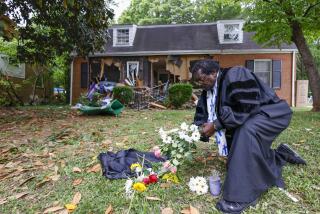Italians Debate Role in Operative’s Saga
Secret meetings. Spies. Forged documents. Government denials. Burglary.
As Washington braces for the possible indictment of some of its most powerful officials, Italy is reliving its own small but significant role in “Niger-Gate,” the scandal that surfaced as the Bush administration made its case for war in Iraq.
If all roads lead to Rome, so do the rumors: Washington’s problem with the leak of a CIA officer’s identity has tentacles here.
Former U.S. diplomat Joseph C. Wilson IV, whose wife was the covert CIA operative whose identity might have been leaked by White House officials, was dispatched in February 2002 to investigate a claim that Iraq was attempting to buy uranium from Niger after documents asserting exactly that surfaced in Rome.
The documents were determined to be forgeries, and Wilson said he found little evidence to back the claim.
Yet the claim was used in late 2002 by British Prime Minister Tony Blair and in early 2003 by President Bush to illustrate the threat posed by the Iraq of Saddam Hussein.
Who forged the documents, which included letters and purported contracts, remains one of the great unsolved mysteries of the affair.
Speculation about how the papers were produced in Rome, and complaints that the Italian government has done little to find out or to come clean, dominated political debate here this week, especially in the left-leaning newspaper La Repubblica, which has dedicated page after page of breathless prose to the matter.
Among its claims, La Repubblica has suggested that the head of Italy’s military secret service, Nicolo Pollari, disseminated the false information to the Bush administration on orders from Prime Minister Silvio Berlusconi, a loyal ally eager to give Bush a helping hand.
La Repubblica reported, and Bush administration officials confirmed to The Times, that Pollari met with then-deputy national security advisor Stephen J. Hadley on Sept. 9, 2002. Hadley later took the blame for including the incorrect claim in Bush’s 2003 State of the Union address.
Pollari went directly to Hadley, as well as to other administration neoconservative contacts, because CIA agents in Rome were rebuffing his overtures, apparently not considering the documents to be credible, La Repubblica reported.
Pollari will go before a closed hearing of the Italian Parliament next week to explain his role. The Berlusconi government has repeatedly denied that the military intelligence service fabricated the now-discredited dossier.
“The government flatly denies any truth to the allegations, as per our communiques issued in July 2003 and August 2004,” an official statement said this week. The newspaper reports are “false and devoid of all foundation,” the government said.
The murky saga involves one Rocco Martino, an occasional Italian spy and businessman who initially peddled the documents. He has told reporters over the last few years that he obtained the papers through a contact at the Niger Embassy in Rome (which, incidentally, was burglarized in 2001) with the help of another officer from Italian military intelligence, and that he sold them to a French intelligence agency with which he occasionally traded.
Through his lawyer, Martino declined an interview this week. “The less I say, the better,” the lawyer, Giuseppe Placidi, quoted Martino as saying. The lawyer would only say that Martino, who was questioned by Italian prosecutors, did not realize the material was fake and did not obtain it from military intelligence.
Martino is a problematic figure. La Repubblica described him as a “failed carabiniere [policeman] and dishonest spy” and a “double-dealer” who plays many sides of every fence and was fired from his job in the Italian secret service.
In 2002, the documents came into the hands of an Italian reporter, Elisabetta Burba, working for the magazine Panorama, which is owned by Berlusconi, the prime minister.
Burba has not publicly identified her source, except to say he was a usually reliable “security consultant,” and she declined to do so again Thursday in an interview. But news reports have said Martino was her source. On orders from her editor, she handed copies of the documents over to the U.S. Embassy in Rome. Separately, she traveled to Niger to check out the claims herself, notably that Iraq was attempting to buy 500 tons of yellowcake uranium from the African country, and concluded the report was not reliable.
Burba, 43, is an experienced journalist with a repertoire that includes extensive work in Africa, Bosnia and Kosovo. She said she wanted to press ahead with efforts to investigate the case further and determine who forged the documents, but her magazine never published any additional reports. She has also been interviewed by the CBS investigative show “60 Minutes II” for a piece on the documents that was pulled in the wake of the problems that brought down Dan Rather.
Burba said Thursday she was frustrated that the full truth had yet to come out.
“I am very mad,” Burba said. “I was used. And the documents have been used to justify a war where people are being killed. This makes me very uneasy.”
Taking up the cause that has long swirled in conspiracy-minded circles, La Repubblica attempted to link the cooking-up of the dossier to nefarious dealings of assorted hard-line Pentagon hawks, Iranian dissidents and figures from the old Iran-Contra days, several of whom are known to have visited Rome in 2001 around the time the forged documents surfaced. But hard evidence remains elusive.
Times staff writer Tom Hamburger in Washington contributed to this report.
More to Read
Start your day right
Sign up for Essential California for news, features and recommendations from the L.A. Times and beyond in your inbox six days a week.
You may occasionally receive promotional content from the Los Angeles Times.







